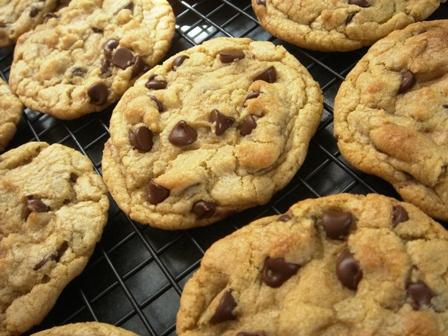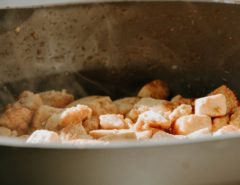By: Kimberlee Au
As a budding food scientist who is also part treehugger, I not only think about the ingredients and processes that went into making my food, but I also think about the environmental impact it had. After reading numerous articles and listening to professors lecture about how much energy and water goes into food production, I often worry about my carbon footprint and what I can do to minimize it.
People often ask me, “Why worry about it? None of us will even be alive to experience the consequences of global warming.”But that’s not true. Climate change is currently altering weather patterns resulting in crop shortages which raises the price of feed for livestock[1]. That translates to higher meat prices. Not a meat eater? Adverse weather is also expected to impact wine harvests[2]. Even if you were a sober vegan, wouldn’t you feel a bit guilty if your kids asked you why polar bears no longer existed?
While I know that there’s nothing I can do to magically turn things around, it’s the little things that count. Learning that the production of meat is responsible for one-fifth of the world’s greenhouse gases[3] has caused me to reduce my animal consumption and rely on tofu, nuts, milk, and yogurt as sources of protein. But why not just cut out animal products altogether? It’s definitely possible, with all of the meat and dairy alternatives on the store shelves today. That’s something I think about quite often whenever I’m at the grocery store or in a restaurant. If I reduce the demand, supply will go down. However, after some more thought, I whittled it down to three
main reasons why I am not a strict vegetarian or vegan.
The first is a nutritional reason. Iron deficiency is one of the top nutritional deficiencies. While I could take a supplement or get my iron from plant sources, non-heme iron is just not the same as heme iron. The body absorbs heme iron (from meat, poultry, and fish) far better than non-heme iron. Also, beef, eggs, and milk are at the top of the PDCAAS list, making them the highest quality sources of protein (peanuts and legumes are below 0.8 on the scale). If I’m coming home after a sweaty workout, my body is going to want the highest quality protein it can digest.
Second, as a woman of science, I believe in evolution. Homo sapiens look like they do and have certain body parts for a reason and there must be some reason why I have these canines in my mouth. Most likely because our ancestors Homo erectus needed something sharp to tear and chew their dinner with. If it took hundreds of thousands of years for genus Homo to evolve canines for the benefit of their diet, why shouldn’t I use them?
Lastly, a selfish reason. Sometimes…I just want a nice, juicy burger. Or a thick slice of rare prime rib. Or a sweet, smoky full rack of ribs. When my body wants it, my brain won’t let me stop thinking about it until I get it. I guess you could tie that in with the practice of Intuitive Eating: when you crave something, it’s because your body is telling you that it needs it because that something has a nutrient you’re lacking. If I’m craving that burger or taco, my body must want the nutrients in animal protein.
I am aware of the arguments against each of my justifications, so I’ve come up with compromises to appease both my inner hippie and primal omnivore. If given a choice, I’ll go with the more sustainable option. But if there is no choice, such as a potluck or set menu, where the meat is already cooked and it won’t make a difference whether I eat it or not, I won’t feel as bad if have a serving. And if I’m craving that burger, you can bet it’ll be the best quality burger I can get my hands on.
A surprising number of students studying food science here at Chapman University are actually vegetarian and vegan. I’m not quite sure of their reasons for that lifestyle, but I respect their choices and appreciate their part in reducing carbon emissions.
What I’ve found over the years is that a person’s diet is actually a touchy subject, much like politics and religion. What you choose to consume or not consume says a lot about yourself and I’ve actually gotten into arguments with my parents over this subject. So what I want to know is:
What are your thoughts on vegetarianism/veganism? How do you decide what to eat or not to
eat? Do you follow any guidelines?
[1] United States Department of Agriculture. Economic Research Service. Livestock, Dairy, and Poultry Outlook.
Johnson, Rachel. 2012. Print.
[2] Lobell, David B., Christopher B. Field, Kimberly N. Cahill, and Celine Bonfils. “Impacts of Future Climate
Change on California Perennial Crop Yields: Model Projections with Climate and Crop Uncertainties.” Agricultural
and Forest Meteorology 44.2-4 (2006): 201-18. ScienceDirect.com. Web. 21 Dec. 2012.
[3] Food and Agriculture Organization of the United Nations. Livestock’s Long Shadow: Environmental Issues and
Options. Steinfeld, Henning et al. 2006.
Photo credit: http://www.glenvillepacking.com/files/Raw-Meat-1.jpg






Great post. I am envious of people like you who have the will power to be vegetarian (even if you’re not a “strict one”). I think it’s a very healthy way to live and as you mentioned, it’s much better for the environment. I wish I was able to eat like that but I like eating meat too much. This does bring to mind an interesting documentary I recommend you take a look at called “Forks Over Knives”. In follows the research of two food scientists who linked the eating of meat with the prevalence of certain diseases such as diabetes and cancer.
Interesting Thomas! I have not heard of that documentary. I don’t eat much meat, but I also don’t shy away from it. Everything in moderation, right?